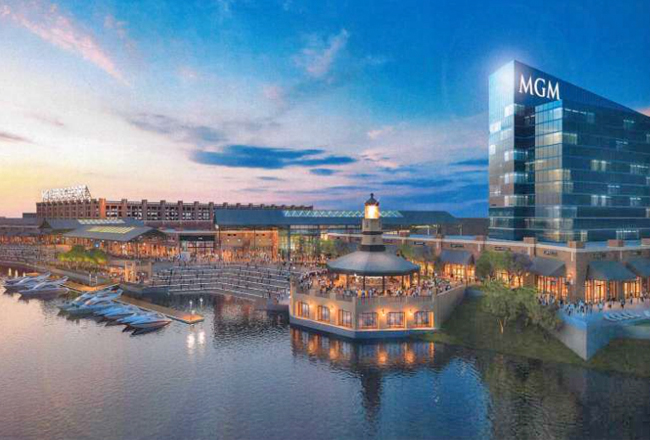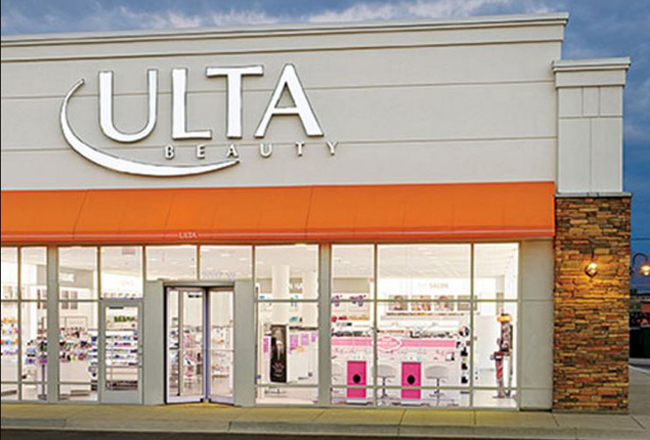MGM Resorts International wants to bring the first casino to Fairfield County and the first nontribal gaming venue to Connecticut with a $675 million development in partnership with RCI Group, the Miami Beach-based developer of Bridgeport”™s Steelepointe Harbor.

The proposed MGM Bridgeport at RCI”™s mixed-use waterfront development would feature a 300-room hotel; a 100,000-square-foot casino with 2,000 slot machines and 160 table games; 30,000 square feet of retail space; a boardwalk on the Yellow Mill River with a 900-foot dock, retail outlets and outdoor entertainment; a 20,000-square-foot entertainment venue with a 700-seat theater; and 60,800 square feet of dining space that would include five restaurants and six bar and lounge locations.
Unveiling its proposed project at a Sept. 18 press conference, MGM Resorts touted financial and economic benefits that include a one-time, $50 million gaming license fee paid to the state; $303 million in state gaming tax revenue in 2019 and $328 million by 2023; 2,000 jobs at the resort casino and 5,000 indirect jobs, and a minimum of $8 million in annual payments to the city of Bridgeport. The Nevada company also projected a total of $667 million in incremental tax revenues from the resort casino over the next five years.
The company in its gaming tax projections estimated the Bridgeport casino would generate $28 million more for the state in 2019 than Connecticut”™s two existing tribal casinos and $83 million more than the off-reservation tribal casino proposed for East Windsor.
“MGM Bridgeport is the right development at the right time and in the right place,” said MGM Resorts International Chairman and CEO James J. Murren, returning to his native Bridgeport for the recent announcement. MGM Resorts said the project will be constructed entirely with private funding.
MGM Resorts said the project will additionally reap $4.5 million in annual total payments to surrounding municipalities. The company also plans to create a workforce development and training program in New Haven for future casino employees.
“There is one phrase to encapsulate my support for this project which will benefit Connecticut”™s two largest cities,” said New Haven Mayor Toni Harp, “and that phrase is ”˜jobs creation.”™ Bold initiatives that engage private capital that will yield significant revenue in the public sector over time are needed. This is that initiative.”
Bridgeport Mayor Joseph Ganim, who earlier this year expressed doubt about the economic benefits that a casino brings to a host community in an interview with the Business Journal, spoke favorably of the proposed casino”™s impact on the city at the waterfront press conference. “Seven thousand jobs ”” and after some 2,000 permanent jobs ”” I think that is the thing economic recoveries are built on,” he said.
Connecticut”™s two tribal casinos, Foxwoods Resort Casino and Mohegan Sun, have seen their combined gaming revenue drop by 7.5 percent between 2013 and 2015, to $1.6 billion, according to Casino City”™s 2017 Indian Gaming Industry Report. Nationally, however, casino gaming revenue on the rise.
Connecticut state law gives exclusive casino development rights on nontribal lands to MMCT Venture, a partnership of the Mohegan and Mashantucket Pequot tribes. MMCT is pursuing approval of a $300 million satellite casino in East Windsor that is viewed by many as a rival venue to MGM”™s planned casino located 15 miles across the state border in Springfield, Massachusetts, which is set to open next year. MGM challenged MMCT”™s exclusive control of Connecticut gaming in court, but its lawsuit was dismissed in June.
However, as MGM Resorts was previewing its project in Bridgeport, the U.S. Department of the Interior”™s Bureau of Indian Affairs announced a delay in its required approval of the tribes”™ East Windsor project. In a letter to state Attorney General George Jepsen, Michael S. Black, acting assistant secretary for Indian affairs, said federal officials found “insufficient information upon which to make a decision as to whether a new casino operated by the Mohegan and Mashantucket Pequot Tribes would or would not violate the exclusivity clauses of the gaming procedures” that limit casinos in the state to reservation lands. “The tribes have entered into an agreement with the state whereby they have agreed that the exclusivity provisions will not be breached by this arrangement. Therefore, our action is unnecessary at this time.”
In the wake of the MGM Resorts announceement, Andrew Doba, a spokesman for MMCT, blasted the Bridgeport project.
“Simply put, authorization of this facility would violate the existing compacts between the two tribes and the state, which would immediately end the slot payments that currently sends the state hundreds of millions a year in much needed revenue,” Doba said. “Our state’s elected officials saw through their (MGM Resorts”™) dishonesty last session, and we expect them to see this latest fib for exactly what it is ”” another bought- and paid-for piece of misinformation.”
MGM Resorts, on a page on its website dedicated to the MGM Bridgeport project, urges Connecticut residents to sign an online petition demanding a change in state law to accommodate the new project and to contact state legislators “to permit this plan to proceed. Ask them to help bring jobs and economic development to Connecticut. Doing nothing would be more of the same that we just can”™t afford.”
Gov. Dannel Malloy suggested the Mohegan and Mashantucket Pequot tribes would decide the fate of MGM Bridgeport. “I can’t imagine any scenario under which the tribal nations would agree to open up the (gaming) compact on those grounds,” Malloy said. “But perhaps they will.”
In Fairfield County, reaction to the MGM Bridgeport proposal was mixed.
Mickey Herbert, president and CEO of the Bridgeport Regional Business Council, said that while his organization has not taken an official position on the project, he was impressed with MGM Resorts”™ presentation. “This could be transformational not only for the city of Bridgeport, but our whole region. This could make Bridgeport a destination place, especially for people coming up from New York City. I always said that Bridgeport could use a spark, and this was like a bonfire.”
Architect Bruce Beinfield, founding principal of Beinfeld Architecture PC in Norwalk, who was credited with spearheading the 1990s revitalization of South Norwalk, expressed concern that a standalone development like MGM Bridgeport, instead of a wider economic development strategy featuring multiple revenue-generating projects, could have results like those in Atlantic City after gaming casinos were introduced there.
“My perception of Atlantic City was that the wealth that was generated there did not filter out into the community as much as it could have and was concentrated in the destination casinos,” he said. “While it was a good job generator, it was not necessarily the kind of development that helps to bring stronger communities.”
Peter Gioia, vice president and economist at the Connecticut Business & Industry Association, also expressed concern about the Bridgeport casino proposal.
“I wish Bridgeport focused a lot more on other developments,” he said. “They have land and the potential to train unemployed people. Financial services support operations or manufacturing would be much more effective for their economic development efforts.”
Gioia added that Interstate 95 would become more clogged because of MGM Bridgeport. “In terms of traffic, it is not an ideal location,” he said.
State Sen. Tony Hwang, a longtime foe of gambling, issued a statement strongly opposing the MGM Bridgeport project.
“Economically, it makes little sense to expand casino gambling when the Northeast faces a growing casino glut,” said the Republican from Fairfield. “You can”™t base a successful, sustainable economy on gambling. And what about the human costs? Casinos spread gambling addiction, debt, bankruptcies and crime. We cannot ignore the societal costs that gambling has brought to Connecticut: The families that have been torn apart, the lost hopes and the suicides. I will continue to raise awareness about the costs of expanded gambling and speak out for the victims.”




















